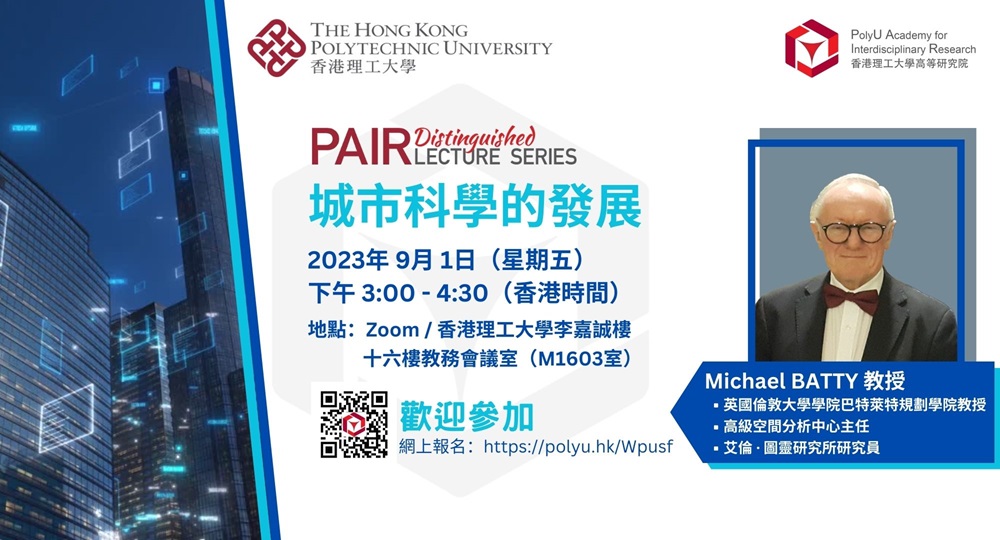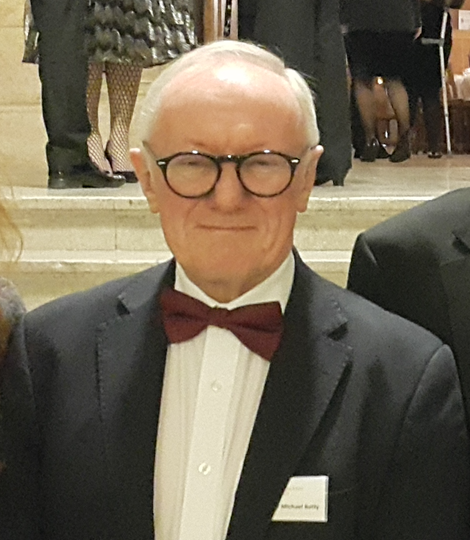理大高等研究院傑出講座系列:城市科學的發展 (只有英文版本)
香港理工大學高等研究院傑出學人講座系列

-
日期
2023年9月1日
-
主辦單位
PolyU Academy for Interdisciplinary Research
-
時間
15:00 - 16:30
-
地點
現場及網上(Zoom / 香港理工大學李嘉誠樓十六樓教務會議室 (M1603室))
講者
Professor Michael Batty
查詢
PolyU Academy for Interdisciplinary Research +852 3400 3036 info.pair@polyu.edu.hk
摘要
Biography
Prof. Michael Batty is Bartlett Professor of Planning at University College London, Chair of the Centre for Advanced Spatial Analysis, and a Fellow in the Alan Turing Institute. He founded the Centre that he chairs in 1995 whose continuing mission is to develop a science of cities focussed on digital methods for developing plans for sustainable and equitable cities. Prior to this he directed the NSF National Center for Geographic Information and Analysis at the State University of New York at Buffalo (1990-1995), was Professor of Town Planning at the University of Wales Institute of Science and Technology in Cardiff from 1979 to 1990 where he acted as Head of Department and Dean of Architecture and Planning, and Lecturer then Reader in Geography at the University of Reading from 1969 to 1979.
He was elected a Fellow of the Royal Society of Arts (FRSA) in 1982, a Fellow of the British Academy (FBA) in 2001, the Academy of Social Sciences (FAcSS) in 2001, and was awarded a CBE in the Queen’s Birthday Honours in June 2004. He was elected a Fellow of the Royal Society (FRS) in 2009, and is the recipient of the 2013 Lauréat Prix International de Géographie Vautrin Lud (https://en.wikipedia.org/wiki/Vautrin_Lud_Prize (The ‘Nobel’ for Geography:). He was awarded the Gold Medal (Founder’s Medal) of the Royal Geographical Society in 2015, the Gold Medal of the Royal Town Planning Institute in 2016, the Senior Scholars’ Award of the Complex Systems Society in 2016, and the Waldo Tobler prize for GI Science of the Austrian Academy of Sciences in 2018, In 2022, he was elected a Fellow of the Geographical Society of China (中国地理学) (http://www.gsc.org.cn/gsc/) and he received the Outstanding Achievement Award of the Geographical Systems Commission of the IGU (International Geographical Union). He is amongst the most highly-cited urban planners world-wide (with an H score of 115).
His research work involves the development of data systems, computer models of cities, and planning methods, and he has published many books and articles in this area, the most recent being Cities and Complexity (MIT Press, Cambridge, MA, 2007) and The New Science of Cities (MIT Press, Cambridge, MA, 2013), both of which were awarded the Alonso Prize of the Regional Science Association in 2011 and 2017. His most recent book Inventing Future Cities was published by MIT Press in late 2018. He is a co-editor of Urban Informatics (Springer, 2021), and editor of the journal Environment and Planning B. His research work is at http://www.complexcity.info/ and https://www.ucl.ac.uk/bartlett/casa/people/staff. In 2021 with Wei Yang, he set up the Digital Taskforce for Planning, an independent inquiry into the need for a transformation in the way the UK planning system can embrace questions of how the digital revolution might contribute to modernizing the planning system (https://digital4planning.com/).
He has won many research grants raising some £13 million since 2010 and he has established many links with similar research groups globally, in particular with universities in the USA, Australia, and China and the Far East. He has visiting professorships at Tsinghua, Wuhan, Shenyang, Tongji, the Hong Kong Polytechnic University, the Chinese University of Hong Kong, University of Cardiff and Arizona State University. He has graduated some 62 and has externally examined 144 Doctorates.
Abstract
Urban planning and our understanding of cities is being revolutionalised by developments in computation, big data and artificial intelligence. Although I will focus on a new science of cities culled from complexity theory, it is important to note that there is not one science but many and this is providing a rich array of theories, models, and ideas that are being fused with new approaches to urban planning that are much wider and deeper than anything that we have developed in the last one hundred years. I will sketch the rudiments of a science of cities building on ideas in social physics, economics, transportation and a wide array of techniques and tools that are being developed using new methods of computation and big data. I will illustrate this with examples of large scale computer models that are now being built not simply for single cities but for systems of cities, indeed entire national urban systems which now dominate the global world in which we live. I will conclude by speculating on some of the dilemmas of prediction that dominate the field and imply that the way forward is to evolve ensembles of prediction that enable to us to engage in informed discussion of our urban future.
講者

Professor Michael Batty
Bartlett Professor of Planning, University College London
Chair, Centre for Advanced Spatial Analysis
Fellow, Alan Turing Institute


